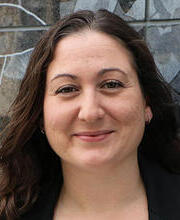April M. Craft

Our research focuses on both developmental biology and translational medicine, and involves the use of pluripotent stem cells to understand how musculoskeletal lineages, primarily articular chondrocytes and cartilage tissues, are specified during embryonic development and how mature cells and tissues are maintained or regenerated after birth and in the adult. The goal is then to apply this knowledge towards the development of improved therapeutics for skeletal diseases including congenital joint disorders and arthritis.
Defining the Human Chondrocyte Lineage. Degenerative joint disease, also known as osteoarthritis, is among the top 5 most costly medical conditions in the Unites States. In part, this is due to the lack of adequate treatments that are available for damaged joint tissues. One of the challenges of repairing articular cartilage is that this tissue forms prenatally, and regeneration does not normally occur after birth. We therefore hypothesize that a better understanding of how joint tissues arise during embryonic development will enable us to develop better approaches for treating damaged joint tissues (e.g., articular cartilage) in patients. Our lab uses the human pluripotent stem cell model (the abbreviation hPSCs refers to both embryonic stem cells and induced pluripotent stem cells) to investigate the process of cartilage development and also generate tissues for transplantation experiments and drug screening. Our previous studies have shown that by providing developmental signals that mimic how cartilage is specified in the embryo, we can reproducibly and efficiently generate two distinct cartilage lineages from hPSCs. One chondrocyte lineage has the ability to generate stable cartilage in vivo (a function of articular cartilage) and the other produces a cartilaginous tissue that undergoes ossification (a function of growth plate cartilage to form new bone). Our efforts are focused on further understanding how these different types of cartilage are specified and how they mature after birth.
Synovial Joint Development. It is hypothesized that articular chondrocytes and other synovial joint tissues arise from a progenitor population found within the interzone of developing joints in vivo. The ability to faithfully recapitulate the development of these two distinct chondrogenic lineages in vitro using hPSCs allows us to access progenitor populations that are otherwise difficult to obtain in sufficient cell numbers from appropriately staged embryos. Our lab is interested in identifying and characterizing human joint progenitor cells using novel molecular markers and fluorescent reporter lines, and determining their developmental potential using various functional assays in vitro and in vivo. Knowledge of joint development will likely provide insights towards the development of novel therapeutics, in the form of cells or tissues for cartilage repair, or drugs that might stimulate one's own cartilage cells to repair damaged tissue.
Modeling Disease in a Dish. Damage to articular cartilage can occur for a number of reasons (e.g., joint injuries, mechanical instability, genetic predisposition). Because many patients do not feel pain during the early stages of degeneration, the cartilage continues to progressively deteriorate. The impact of these factors and others on cartilage health is difficult to assess. We have observed pathologically relevant catabolic changes in hPSC-derived articular cartilage tissues in response to environmental stresses, such as the pro-inflammatory cytokines found in arthritic joints. These data suggest that hPSC-derived cartilage tissues will be a useful model to identify early cartilage-specific changes that can result in progressive degeneration and disease. Furthermore, the use of cartilage tissues derived from patient-specific iPSCs will be invaluable to understand the genetic basis of disease mechanisms.
Contact Information
Orthopaedic Research Laboratories, Enders 260
320 Longwood Avenue
Boston, MA 02115
